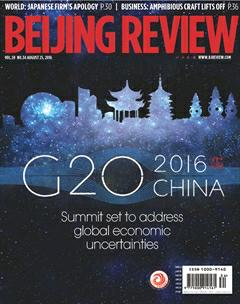Understanding China Through Keywords
2016-09-13
Understanding China Through Keywords
Learning keywords is one of the best ways to keep abreast of the latest developments in a country. The China Academy of Translation, a research institute affiliated with the China International Publishing Group, the country's leading international publisher, regularly analyzes prevailing Chinese terms in various sectors and translates them into a number of foreign languages ranging from English to Arabic. In each issue, Beijing Review presents a selection of these keywords to help readers know more about China.
Political development under socialism with Chinese characteristics
Political development under socialism with Chinese characteristics has evolved over time as the Chinese people made sustained efforts to build a better society under the leadership of the Communist Party of China (CPC) by integrating the basic tenets of Marxism with China's specifc conditions. The key features of such a process comprise leadership by the CPC, ownership by the people, and the rule of law. It is informed by continued efforts to improve the system of people's congresses, multiparty cooperation and political consultation under the leadership of the CPC, regional ethnic autonomy and community-level self-governance. Its objective is to continuously improve and develop the socialist political system.
Political rules
Addressing the Fifth Plenary Meeting of the 18th Central Commission for Discipline Inspection of the CPC on January 13, 2015, President Xi Jinping coined the term “political rules,” which soon drew public attention.
The political rules applicable to CPC members include,inter alia:
1. the Constitution of the CPC, which is the overriding statute that all members of the Party must observe;
2. Party discipline, which is mandatory and binding,requiring all members of the Party to strictly abide by the guidelines and principles of the Party when making speeches or taking actions of a political nature;
3. state laws, which exempt no CPC member or offcial;
4. the great traditions and working practices developed by the Party over the years, which must be maintained.
Multiparty cooperation and political consultation under the leadership of the CPC
China's political party system is different from two-party or multiparty systems of Western countries or one-party systems in some other countries. It is based on multiparty cooperation and political consultation under the leadership of the CPC. There are at present nine political parties in China. They are, in addition to the CPC, the Revolutionary Committee of the Chinese Kuomintang, established in 1948; the Chinese Democratic League, founded in 1941; the China National Democratic Construction Association, founded in 1945; the China Association for Promoting Democracy, established in 1945; the Chinese Peasants' and Workers' Democratic Party, established in 1930;the China Zhi Gong Party, founded in 1925; the Jiu San Society, established in 1945; and the Taiwan Democratic Self-Government League,established in 1947.
China's political party system is prominently characterized by the CPC's leadership role in governing the country with cooperation from and participation of all the other parties. Rather than being opposition parties or parties not in power, the other parties work closely with the CPC as partners and participate in government. They are involved in decision-making at all levels, consultations on national priorities and guidelines and the selection of candidates for state leadership positions, the management of state affairs, and the formulation and implementation of state policies, laws and regulations. The CPC always cherishes its long-time partnership with the other parties, a partnership reinforced by mutual oversight and mutual trust and inspired by a shared desire to forge ahead together through thick and thin.
